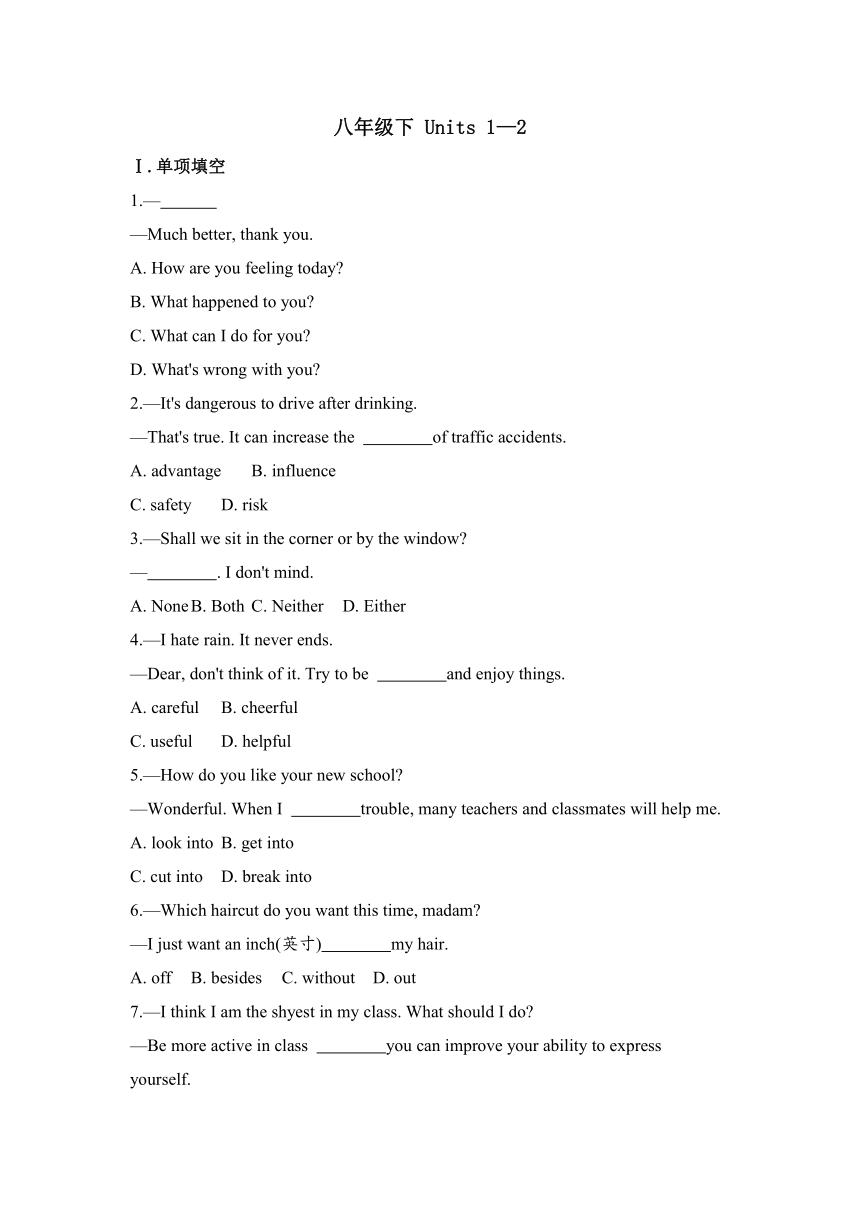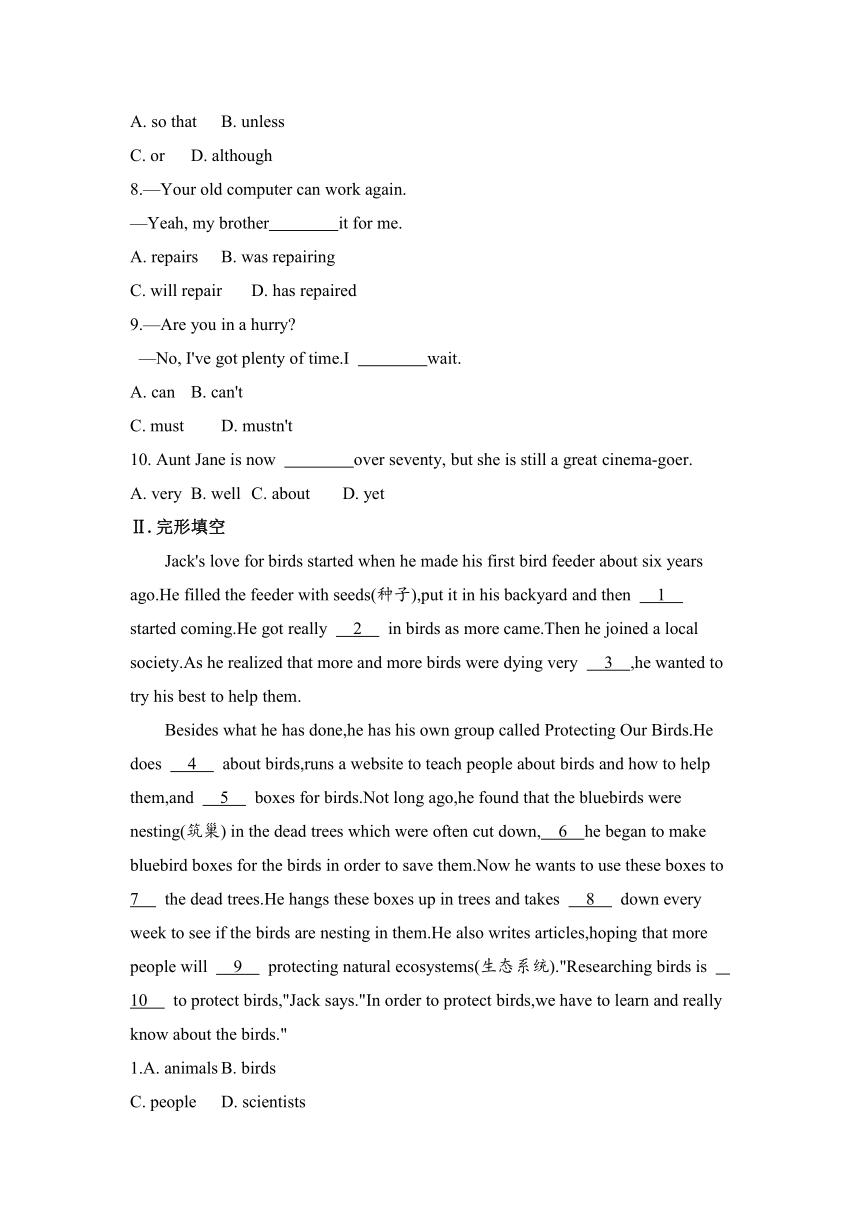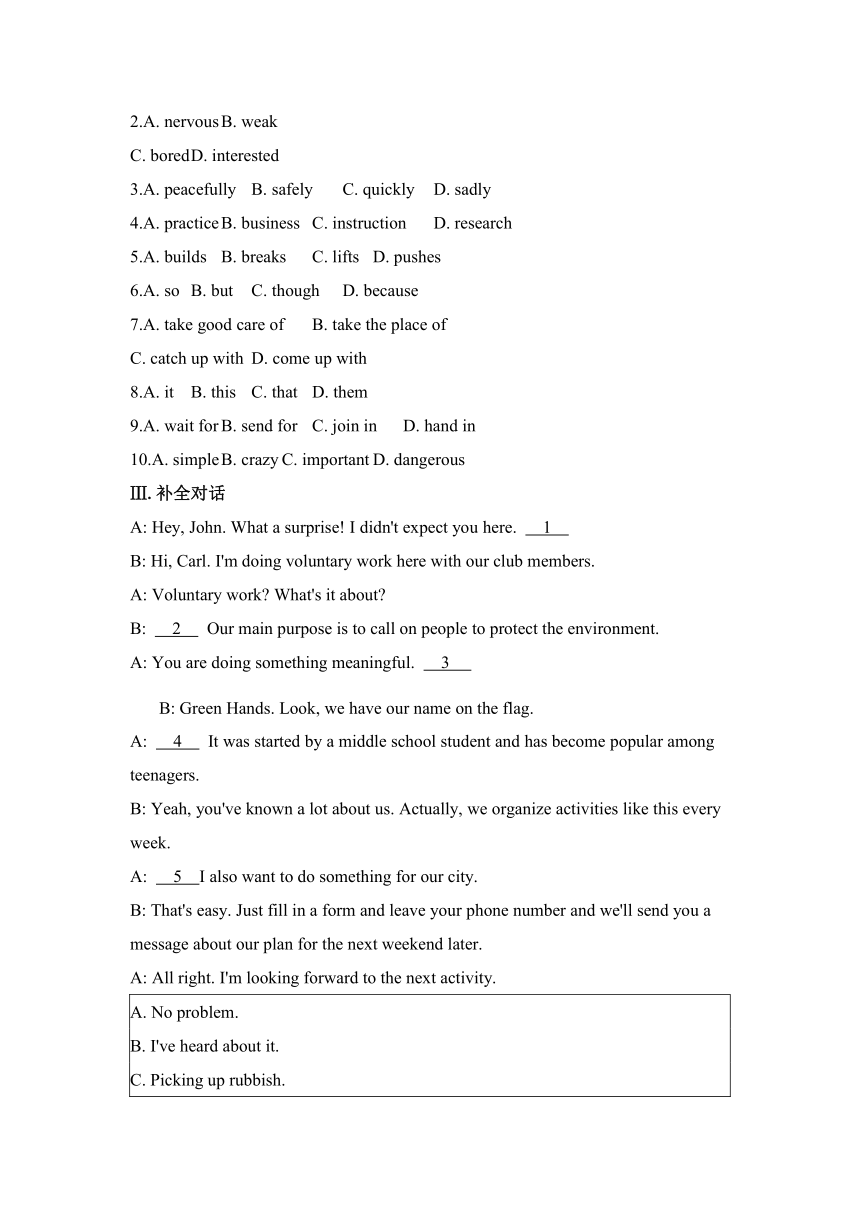2021年安徽(人教版)九年级英语中考一轮复习训练:八年级下 Units 1—2(含答案)
文档属性
| 名称 | 2021年安徽(人教版)九年级英语中考一轮复习训练:八年级下 Units 1—2(含答案) |  | |
| 格式 | doc | ||
| 文件大小 | 50.0KB | ||
| 资源类型 | 教案 | ||
| 版本资源 | 人教新目标(Go for it)版 | ||
| 科目 | 英语 | ||
| 更新时间 | 2021-02-17 11:13:02 | ||
图片预览



文档简介
八年级下 Units 1—2
Ⅰ.单项填空
1.— ?
—Much better, thank you.
A. How are you feeling today?
B. What happened to you?
C. What can I do for you?
D. What's wrong with you?
2.—It's dangerous to drive after drinking.
—That's true. It can increase the of traffic accidents. ?
A. advantage B. influence
C. safety D. risk
3.—Shall we sit in the corner or by the window?
— . I don't mind.?
A. None B. Both C. Neither D. Either
4.—I hate rain. It never ends.
—Dear, don't think of it. Try to be and enjoy things. ?
A. careful B. cheerful
C. useful D. helpful
5.—How do you like your new school?
—Wonderful. When I trouble, many teachers and classmates will help me.?
A. look into B. get into
C. cut into D. break into
6.—Which haircut do you want this time, madam?
—I just want an inch(英寸) my hair.?
A. off B. besides C. without D. out
7.—I think I am the shyest in my class. What should I do?
—Be more active in class you can improve your ability to express yourself. ?
A. so that B. unless
C. or D. although
8.—Your old computer can work again.
—Yeah, my brother it for me.?
A. repairs B. was repairing
C. will repair D. has repaired
9.—Are you in a hurry?
—No, I've got plenty of time.I wait.?
A. can B. can't
C. must D. mustn't
10. Aunt Jane is now over seventy, but she is still a great cinema-goer.?
A. very B. well C. about D. yet
Ⅱ.完形填空
Jack's love for birds started when he made his first bird feeder about six years ago.He filled the feeder with seeds(种子),put it in his backyard and then 1 started coming.He got really 2 in birds as more came.Then he joined a local society.As he realized that more and more birds were dying very 3 ,he wanted to try his best to help them.?
Besides what he has done,he has his own group called Protecting Our Birds.He does 4 about birds,runs a website to teach people about birds and how to help them,and 5 boxes for birds.Not long ago,he found that the bluebirds were nesting(筑巢) in the dead trees which were often cut down, 6 he began to make bluebird boxes for the birds in order to save them.Now he wants to use these boxes to 7 the dead trees.He hangs these boxes up in trees and takes 8 down every week to see if the birds are nesting in them.He also writes articles,hoping that more people will 9 protecting natural ecosystems(生态系统)."Researching birds is 10 to protect birds,"Jack says."In order to protect birds,we have to learn and really know about the birds."?
1.A. animals B. birds
C. people D. scientists
2.A. nervous B. weak
C. bored D. interested
3.A. peacefully B. safely C. quickly D. sadly
4.A. practice B. business C. instruction D. research
5.A. builds B. breaks C. lifts D. pushes
6.A. so B. but C. though D. because
7.A. take good care of B. take the place of
C. catch up with D. come up with
8.A. it B. this C. that D. them
9.A. wait for B. send for C. join in D. hand in
10.A. simple B. crazy C. important D. dangerous
Ⅲ.补全对话
A: Hey, John. What a surprise! I didn't expect you here. 1 ?
B: Hi, Carl. I'm doing voluntary work here with our club members.
A: Voluntary work? What's it about?
B: 2 Our main purpose is to call on people to protect the environment.?
A: You are doing something meaningful. 3 ?
B: Green Hands. Look, we have our name on the flag.
A: 4 It was started by a middle school student and has become popular among teenagers.?
B: Yeah, you've known a lot about us. Actually, we organize activities like this every week.
A: 5 I also want to do something for our city.?
B: That's easy. Just fill in a form and leave your phone number and we'll send you a message about our plan for the next weekend later.
A: All right. I'm looking forward to the next activity.
A. No problem.
B. I've heard about it.
C. Picking up rubbish.
D. How can I join the club?
E. What are you busy with?
F. I believe it will be amazing.
G. What's the name of your club?
Ⅳ.阅读理解
A
At the beginning of this term, I was lucky enough to be chosen as a volunteer docent(讲解员) of the Power Station of Art. I had thought that being a docent would be easy, but I was wrong.
When I started my work, I could not make myself understood. I was rather nervous, though the visitors were smiling at me all the time. I knew it was mainly because I hadn't prepared well enough. I decided to change.
I printed out all the information about the exhibition(展览). I read every word carefully and marked the key points. It was quite a big collection, with over 50 pieces of artworks on show. I chose 20 of them as the main focus of my guidance. Then, I divided them into four groups. Every day, I tried to remember one of my guiding scripts(讲稿) and practiced it the next day.
A week later, I kept all the key points in my heart and then I practiced retelling them again and again. The next day at the Power Station of Art, I managed to give a smooth introduction to the visitors.
I was glad that I wasn't beaten by failure. Now I've realized that you will never know what you can do until you try your best.
1.The writer felt so when she knew she could be a volunteer docent.?
A. lucky B. nervous C. shy D. difficult
2.What do Paragraphs 3-4 mainly talk about?
A. What to be on show.
B. Where to retell the key points.
C. When to practice the guiding scripts.
D. How to prepare for the exhibition.
3.What can we learn from the passage?
A. Think hard before doing something.
B. It's never too old to learn.
C. Where there is a will, there is a way.
D. A good beginning makes a good ending.
B
A friend invited us to help serve dinner at Tent (帐篷) City. Tents were set up for the homeless in the area. I took my nine-year-old boy with me. He had a lot of questions because this whole thing challenged(挑战) his common ideas about how people lived in the world. "Why don't they have homes? Why don't they get food the way we do?"
We talked through the reasons why people ended up in this kind of situation. Many of the people we served had missing teeth or wore dirty clothes. To my surprise, they were quite thankful that I had brought my boy. Many said how fun it was to have an active child around. After dinner, I saw my son talking about sports happily with several elderly gentlemen. He was having a great time.
As some people returned to their tents, I heard him tell them, "Thanks so much for coming to have dinner with us." I could see that my son's simple words touched them greatly. I hugged him because it touched me too.
We should treat people with respect, no matter who they are. I think my boy has learned this.
4.How old was the writer's son?(不超过5个词)
_____________________________________________________________________
5.What did the boy do after dinner?(不超过10个词)
_____________________________________________________________________
6.What can we learn from this story?(不超过15个词)
_____________________________________________________________________
Ⅴ.单词拼写
1.I haven't been back for a long time. There was a big c (变化) in my hometown.?
2.Be careful with those k (刀) !?
3.We have to c (携带) a lot of books in our bags every day.?
4.He arrived here s (数个) hours ago.?
5.Doctors think he will go b (失明的).?
八年级下 Units 1—2
Ⅰ.1—5 ADDBB 6—10 AADAB
Ⅱ.1—5 BDCDA 6—10 ABDCC
Ⅲ.1—5 ECGBD
Ⅳ.1—3 ADC
4.He was 9./He was nine (years old).
5.He talked about sports happily with several elderly gentlemen.
6.We should treat people with respect, no matter who they are.
Ⅴ.1.change 2.knives 3. carry 4.several 5.blind
Ⅰ.单项填空
1.— ?
—Much better, thank you.
A. How are you feeling today?
B. What happened to you?
C. What can I do for you?
D. What's wrong with you?
2.—It's dangerous to drive after drinking.
—That's true. It can increase the of traffic accidents. ?
A. advantage B. influence
C. safety D. risk
3.—Shall we sit in the corner or by the window?
— . I don't mind.?
A. None B. Both C. Neither D. Either
4.—I hate rain. It never ends.
—Dear, don't think of it. Try to be and enjoy things. ?
A. careful B. cheerful
C. useful D. helpful
5.—How do you like your new school?
—Wonderful. When I trouble, many teachers and classmates will help me.?
A. look into B. get into
C. cut into D. break into
6.—Which haircut do you want this time, madam?
—I just want an inch(英寸) my hair.?
A. off B. besides C. without D. out
7.—I think I am the shyest in my class. What should I do?
—Be more active in class you can improve your ability to express yourself. ?
A. so that B. unless
C. or D. although
8.—Your old computer can work again.
—Yeah, my brother it for me.?
A. repairs B. was repairing
C. will repair D. has repaired
9.—Are you in a hurry?
—No, I've got plenty of time.I wait.?
A. can B. can't
C. must D. mustn't
10. Aunt Jane is now over seventy, but she is still a great cinema-goer.?
A. very B. well C. about D. yet
Ⅱ.完形填空
Jack's love for birds started when he made his first bird feeder about six years ago.He filled the feeder with seeds(种子),put it in his backyard and then 1 started coming.He got really 2 in birds as more came.Then he joined a local society.As he realized that more and more birds were dying very 3 ,he wanted to try his best to help them.?
Besides what he has done,he has his own group called Protecting Our Birds.He does 4 about birds,runs a website to teach people about birds and how to help them,and 5 boxes for birds.Not long ago,he found that the bluebirds were nesting(筑巢) in the dead trees which were often cut down, 6 he began to make bluebird boxes for the birds in order to save them.Now he wants to use these boxes to 7 the dead trees.He hangs these boxes up in trees and takes 8 down every week to see if the birds are nesting in them.He also writes articles,hoping that more people will 9 protecting natural ecosystems(生态系统)."Researching birds is 10 to protect birds,"Jack says."In order to protect birds,we have to learn and really know about the birds."?
1.A. animals B. birds
C. people D. scientists
2.A. nervous B. weak
C. bored D. interested
3.A. peacefully B. safely C. quickly D. sadly
4.A. practice B. business C. instruction D. research
5.A. builds B. breaks C. lifts D. pushes
6.A. so B. but C. though D. because
7.A. take good care of B. take the place of
C. catch up with D. come up with
8.A. it B. this C. that D. them
9.A. wait for B. send for C. join in D. hand in
10.A. simple B. crazy C. important D. dangerous
Ⅲ.补全对话
A: Hey, John. What a surprise! I didn't expect you here. 1 ?
B: Hi, Carl. I'm doing voluntary work here with our club members.
A: Voluntary work? What's it about?
B: 2 Our main purpose is to call on people to protect the environment.?
A: You are doing something meaningful. 3 ?
B: Green Hands. Look, we have our name on the flag.
A: 4 It was started by a middle school student and has become popular among teenagers.?
B: Yeah, you've known a lot about us. Actually, we organize activities like this every week.
A: 5 I also want to do something for our city.?
B: That's easy. Just fill in a form and leave your phone number and we'll send you a message about our plan for the next weekend later.
A: All right. I'm looking forward to the next activity.
A. No problem.
B. I've heard about it.
C. Picking up rubbish.
D. How can I join the club?
E. What are you busy with?
F. I believe it will be amazing.
G. What's the name of your club?
Ⅳ.阅读理解
A
At the beginning of this term, I was lucky enough to be chosen as a volunteer docent(讲解员) of the Power Station of Art. I had thought that being a docent would be easy, but I was wrong.
When I started my work, I could not make myself understood. I was rather nervous, though the visitors were smiling at me all the time. I knew it was mainly because I hadn't prepared well enough. I decided to change.
I printed out all the information about the exhibition(展览). I read every word carefully and marked the key points. It was quite a big collection, with over 50 pieces of artworks on show. I chose 20 of them as the main focus of my guidance. Then, I divided them into four groups. Every day, I tried to remember one of my guiding scripts(讲稿) and practiced it the next day.
A week later, I kept all the key points in my heart and then I practiced retelling them again and again. The next day at the Power Station of Art, I managed to give a smooth introduction to the visitors.
I was glad that I wasn't beaten by failure. Now I've realized that you will never know what you can do until you try your best.
1.The writer felt so when she knew she could be a volunteer docent.?
A. lucky B. nervous C. shy D. difficult
2.What do Paragraphs 3-4 mainly talk about?
A. What to be on show.
B. Where to retell the key points.
C. When to practice the guiding scripts.
D. How to prepare for the exhibition.
3.What can we learn from the passage?
A. Think hard before doing something.
B. It's never too old to learn.
C. Where there is a will, there is a way.
D. A good beginning makes a good ending.
B
A friend invited us to help serve dinner at Tent (帐篷) City. Tents were set up for the homeless in the area. I took my nine-year-old boy with me. He had a lot of questions because this whole thing challenged(挑战) his common ideas about how people lived in the world. "Why don't they have homes? Why don't they get food the way we do?"
We talked through the reasons why people ended up in this kind of situation. Many of the people we served had missing teeth or wore dirty clothes. To my surprise, they were quite thankful that I had brought my boy. Many said how fun it was to have an active child around. After dinner, I saw my son talking about sports happily with several elderly gentlemen. He was having a great time.
As some people returned to their tents, I heard him tell them, "Thanks so much for coming to have dinner with us." I could see that my son's simple words touched them greatly. I hugged him because it touched me too.
We should treat people with respect, no matter who they are. I think my boy has learned this.
4.How old was the writer's son?(不超过5个词)
_____________________________________________________________________
5.What did the boy do after dinner?(不超过10个词)
_____________________________________________________________________
6.What can we learn from this story?(不超过15个词)
_____________________________________________________________________
Ⅴ.单词拼写
1.I haven't been back for a long time. There was a big c (变化) in my hometown.?
2.Be careful with those k (刀) !?
3.We have to c (携带) a lot of books in our bags every day.?
4.He arrived here s (数个) hours ago.?
5.Doctors think he will go b (失明的).?
八年级下 Units 1—2
Ⅰ.1—5 ADDBB 6—10 AADAB
Ⅱ.1—5 BDCDA 6—10 ABDCC
Ⅲ.1—5 ECGBD
Ⅳ.1—3 ADC
4.He was 9./He was nine (years old).
5.He talked about sports happily with several elderly gentlemen.
6.We should treat people with respect, no matter who they are.
Ⅴ.1.change 2.knives 3. carry 4.several 5.blind
